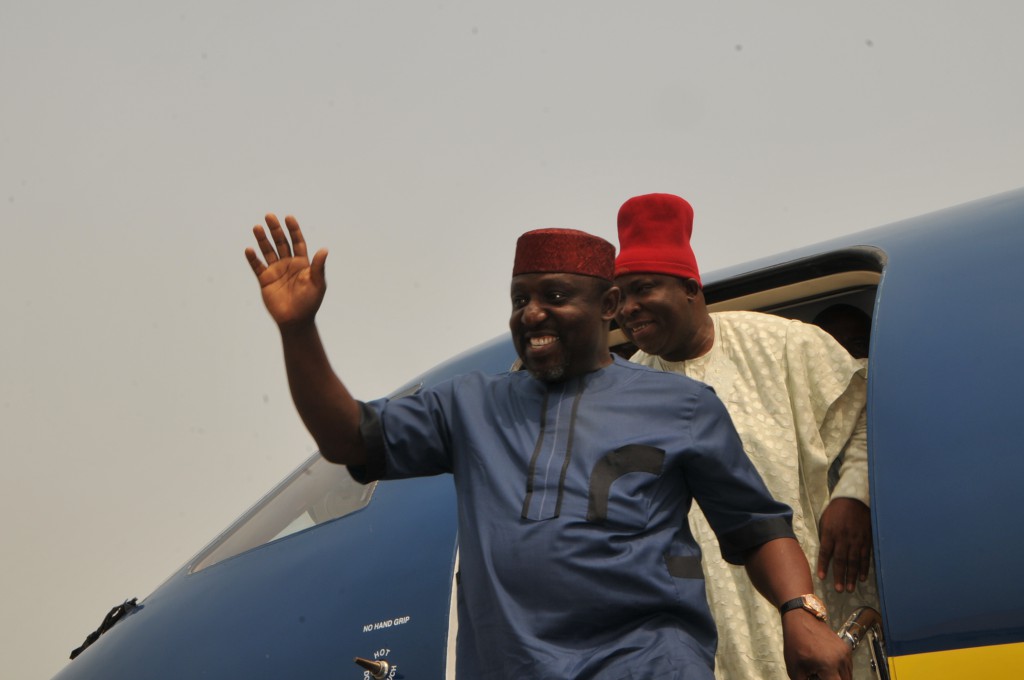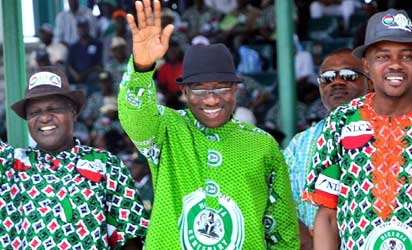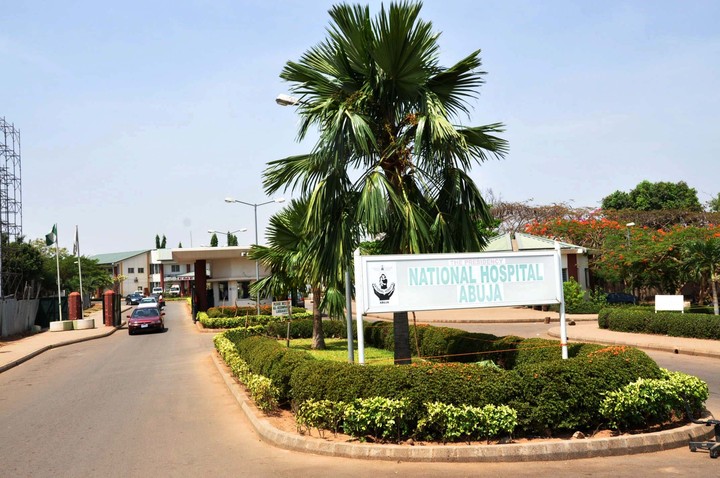Okorocha sure can travel

It’s called defection – “not travelling” – as politicians jump from party to party at the slightest provocation.
In the world of career-enhancement, defections are to politicians what résumés are to the rest of us. Political defection, also known as cross carpeting, defection or basically, dumping one political party for another increases the chances of ministerial office and clout faster than longsuffering loyalty.
Defections are now a staple in Nigerian politics, with prominent politician Balarabe Musa quoted as saying: “The defection by members of political parties is mindless. This is because there is a lot of loose money in the country and anybody with sufficient money can go to any other party to achieve his ambition. The root of defection is money politics.”
Blamed for stalling the passage of Nigeria’s budget, defections briefly wiped out the ruling Peoples Democratic Party’s majority in the House of Representatives.In retaliation, the PDP is lobbying lawmakers, dangling automatic 2015 election tickets to opposition lawmakers willing to dump their parties, particularly those from the opposition All Progressives Congress (APC).
Advertisement
Add to this the defection of five PDP governors to the APC, which means President Jonathan potentially faces hurdles regarding any amendments to Nigeria’s constitution because two-thirds of state parliaments must approve such amendments; reports of mass defections looming from disgruntled APC members in Ogun, Edo and Oyo states—and you see we are in the midst of a full-blown defection epidemic.
We present a few examples of the varied nuances of Nigeria’s political defections. Be warned—some politicians have moves that would outpace those of a flag in a hurricane.
Advertisement
If no one wants you, start your own party
(you can always defect later)
ROCHAS OKOROCHA
In 1999 under the PDP, Okorocha contested for governorship of Imo State but lost at the primaries. In 2003 he ran for the All Nigeria Peoples Party (ANPP) presidential ticket but lost. He returned to the PDP, working as then-president Olusegun Obasanjo’s Special Adviser on Inter-Party affairs. Try to keep up because by 2005, Okorocha had formed the Action Alliance party, with plans to vie for presidency in the 2007 elections. A few months later, by September 2007 Okorocha was back in the PDP. Again, he had defected by 2010, just in time to run as All Progressives Grand Alliance’s candidate in the Imo State governorship elections held in April 2011. Okorocha was declared winner and is now governor of Imo State. However, his feet remain itchy; in 2013 he decamped to the APC, and is rumored to be “on the brink of defecting to another party.” All rather dizzying, we know.
Trajectory: PDP-ANPP-PDP-AAP-APGA-APC
Advertisement

ATTAHIRU DALHATU BAFARAWA
In 1999 Bafarawa became governor of Sokoto State on the platform of the ANPP and served a second term under the same party from 2003. By 2007, he founded the Democratic People’s Party and was its presidential candidate in that year’s general elections; from there he joined the Action Congress of Nigeria (ACN). He left ACN in 2011 (basing his reasons on the picking of Nuhu Ribadu as holder of ACN’s presidential ticket) and joined the defunct Congress for Progressives Change (CPC). He left the CPC for the APC, and in January 2014 defected to the PDP.
Trajectory: ANPP-DPP-ACN-CPC-APC-PDP
Advertisement
Advertisement
Bend it like… a pendulum

ATIKU ABUBAKAR
Advertisement
Abubakar won the Adamawa State 1999 gubernatorial elections under the PDP but was chosen as vice-presidential candidate before being sworn in as governor. He became vice-president to Olusegun Obasanjo and served two terms. In 2006 Atiku defected to the AC (which later became ACN), and on December 20 was chosen as the party’s presidential candidate for the following year’s elections. After his loss at the polls, Atiku returned to the PDP, announcing again a presidential bid in October 2010. This time didn’t make it past the primaries. On February 2, 2014, Atiku once again moved from the PDP to join the APC – a party now populated by many of his former broom-waving ACN mates.
Trajectory: PDP-AC-PDP-ACN
Advertisement
MOHAMMED ALI NDUME
Ndume was elected to the lower House of Representatives in 2003 under the ANPP platform, achieving a second term and an appointment as Minority Leader in 2007. As Minority Leader, Ndume became more vocal, saying in an interview in September 2010 that “the PDP government has been holding the Federal Government for 11 years now and they have done nothing, except cause chaos in Nigeria.” Nevertheless, just three months later, Ndume had returned to the PDP. In January 2014 Ndume defected again…to the APC. For now.
Trajectory: ANPP-PDP-APC
Learn from the rappers –
freestyle it for visibility’s sake

PETER AYODELE FAYOSE
Fayose was elected governor of Ekiti State under the PDP in 2003 but impeached in 2006, over allegations of fraud. During the 2007 governorship elections, Fayose switched allegiance. Effectively out of the running, he campaigned for the ANPP and its governorship candidate, Yinka Akerele, who lost. Fayose next left for the Progressives Peoples Alliance (PPA), then the Labour Party (LP). But during the 2009 gubernatorial elections, Fayose again worked against the PDP, this time pushing grassroots support for the ACN.
By 2010 even the PDP had had enough of Fayose, and he was expelled from the party. Fayose threw his efforts into the Labour party, formally decamping on February 27, 2010. He ran for Senator with Labour in the 2011 elections and lost.
After the 2011 general election, Fayose returned to the PDP, which later issued a formal letter accepting him back into its fold. Today Fayose is back where it all began—he is the PDP’s flag bearer for Ekiti’s June 2014 guber elections.
Trajectory: PDP-PPA-PDP
FEMI PEDRO
Pedro emerged deputy governor of Lagos State in 2003 under the Action Congress Of Nigeria. He launched a bid for the 2007 governorship ticket of the ACN but failed, a situation that saw Pedro leave for the Labour Party. There, he contested—and lost—the 2007 guber polls. By September 2010, Pedro had defected to the PDP, and declared an intention to run for the 2011 governorship election in Lagos State. He lost, and is now with the APC, after defecting in late 2013.
Trajectory: ACN-Labour Party-PDP-ACN
When in doubt, chicken out
AHMED MUHAMMAD MACCIDO
Maccido is a Senator, serving Sokoto State since 2007 under the PDP. In late 2013, Aliyu Wamakko, the governor of Maccido’s State defected to the APC, taking with him 23 local government chairmen, 27 of the 30 lawmakers in the Sokoto House of Assembly and some lawmakers in the House of Representatives. Maccido was widely reported to be following suit, with his name on a list of 15 Senators seeking to defect. However, Maccido refused to join the APC, his signature absent in the famous defection document submitted to the leadership of the Senate. It has since emerged that Maccido stayed put because of his ambition to return to the Senate in 2015—more so because reports state Wamakko is planning to move on to the Senate, under the APC.
Clearly, Maccido reckons he stands a better chance of bagging the ticket to run under a grateful PDP. We wager he’s right. The APC is fast becoming like an old smartphone filled with bloatware—a lot of heavyweights vying for a few electoral tickets.
You don’t have to take our word for it; here’s former-PDP-heavyweight-turned-APC-supremo Femi Fani-Kayode on the current composition of his party:
“The APC has about four or five constituent parts: the ACN members were never members of the APC, the CPC, ANPP members were never members of the APC. Then you have a group of others. Then you now have the final group to join – those in the PDP. I call them the best of the PDP that rejected what was going on and decided to fight it, and then came and joined the APC.”
Just to add that…Mr Fani-Kayode is reportedly being wooed to defect from the APC…back to the PDP.
2 comments






Nice one ! I call them political jobbler or political prostitute.
Politicians with no conscience and no ideology